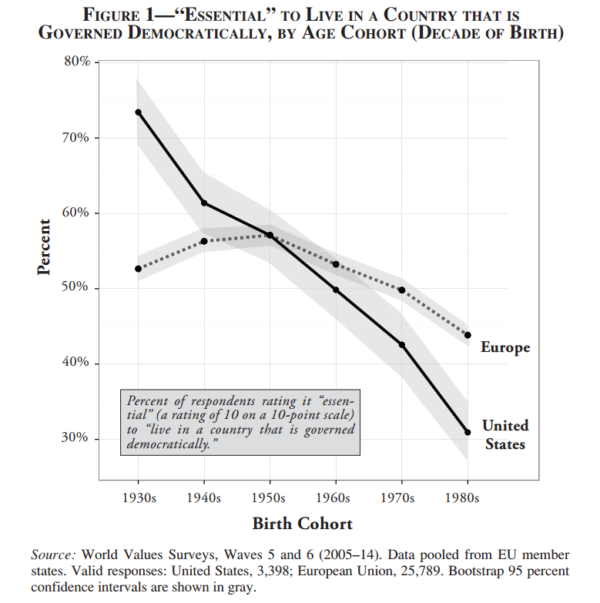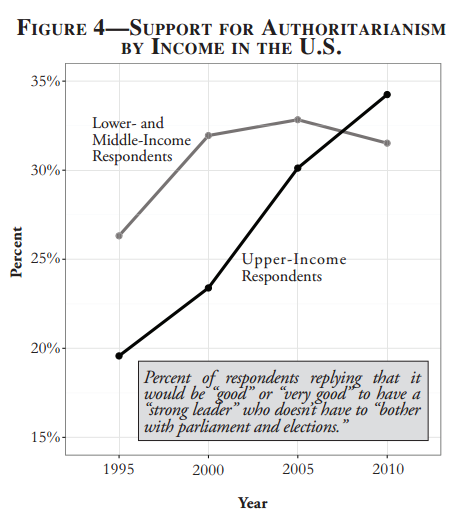With Its Competition Gone, Democracy Showed Us Its True Face, And We Recoiled In Horror
In a recent article entitled “The Danger of Deconsolidation: The Democratic Disconnect” at Journal of Democracy, authors Roberto Stefan Foa and Yascha Mounk give us a roadmap for how democracy will fade away.
Their key concept is the idea of consolidation, which refers to democracy being accepted as the only legitimate form of government. As written in the seminal article on the topic, consolidated democracies are those where democratic methods have a monopoly on politics:
First, in a modern polity, free and authoritative elections cannot be held, winners cannot exercise the monopoly of legitimate force, and citizens cannot effectively have their rights protected by a rule of law unless a state exists.
…In sum, when we talk about the consolidation of democracy, we are not dealing with liberalized nondemocratic regimes, or with pseudo-democracies, or with hybrid democracies where some democratic institutions coexist with nondemocratic institutions outside the control of the democratic state.
…Essentially, by a “consolidated democracy†we mean a political regime in which democracy as a complex system of institutions, rules, and patterned incentives and disincentives has become, in a phrase, “the only game in town.â€
A consolidated democracy is one where all of the institutions in that society function according to democratic principles, all politics are conducted through democratic methods, and democracy has “legitimacy” in that it is seen as the only acceptable system of government. The instant that other methods are introduced, democracy loses its consolidation, or monopoly over political methods.
In “The Danger of Deconsolidation,” this definition of consolidation is expanded:
In our view, the degree to which a democracy is consolidated depends on three key characteristics: the degree of popular support for democracy as a system of government; the degree to which antisystem parties and movements are weak or nonexistent; and the degree to which the democratic rules are accepted. (15)
In other words, if any of these three change — faith in democracy, broad acceptance of alternatives, or rejection of democratic rules — the democracy is unstable and prone to being replaced. This provides a framework for replacement of democracy:
- Subvert faith in democracy
- Build an alternative party
- Reject democratic rules
Movements such as the (European) New Right and the Alt Right have tackled the first and third by creating a cultural wave against democratic thinking and the vanguard of democracy, civil rights. Civil Rights, which inherently involves multiculturalism per its history, is the most extreme form of egalitarianism yet found, and also an existential threat to the cultures ruled by democracy, which means that acceptance of it means these conquered people are open to all forms of egalitarianism.
Foa and Mounk start out by pointing out the elephant in the room: people are dissatisfied with democracy. Only 13% of Americans believe in their elected representatives, and in Europe, discontent is rising as well. This creates a situation where people are psychologically open to alternatives to democracy.
What is interesting about this is that, much like in the forces that propelled the election of Donald Trump, the anti-democratic sentiment is strongest among those who are more affluent because they are the ones being taxed to pay for the lower-income strata of their society. They are no longer defending democratic institutions, but want a competent leader to evade them:
One reason for these changes is that whereas two decades ago affluent citizens were much more likely than people of lower income groups to defend democratic institutions, the wealthy are now moderately more likely than others to favor a strong leader who can ignore democratic institutions (see Figure 4 below). (13)
Now, if we are reading between the lines in this article, we see what is happening here: democracy is deconsolidating. Those who know best, meaning the higher earners who run their own businesses or departments or professional practices, no longer have faith in democratic methods or democracy, following the subversion path outlined by the Alt Right.
At the same time, those of relatively lower income are more likely to support democracy because they are the recipients of benefits, and therefore are afraid of losing what is being given to them, at least without a corresponding reduction in their costs, taxes or obligations. The Alt Right can win here not by supporting more social programs, but by supporting a radical tax reduction for the lower middle class. If it does not do this, it will strengthen confidence in democracy, and thus undo the Alt Right idea of hierarchy replacing equality.
Democracies survive when they have both wealth and consolidation. If either of those changes, the democracy will become ripe to fall:
Democracies that are both wealthy and consolidated, however, appear to be safe: As Adam Przeworski and Fernando Limongi have shown, no consolidated democracy with a GDP per capita of over $6,000 in 1985 international prices has ever collapsed. (14)
In the modern West, we are primed to lose both of these things. First, our economy is ripe for downfall because of the past twenty years of dot-com wealth evaporating; next, as “The Danger of Deconsolidation” tells us, it is already partially deconsolidating as people lose faith in leaders like Angela Merkel and Theresa May.
Looking back over the past thirty years, we see that when Soviet Communism fell, so did the only force that both restrained democracy and made citizens of democracies afraid of “The Other Side.” Communism was a threat not because it was obvious that it would fall, but that if it worked for a century or more, it would be serious competition for the Leftward slide of the West that also included capitalism in the trend following the French Revolution.
One way to see this is through rich-country, poor-country responses. In the wealthy West, it made sense to simply “graft on” socialism lite by installing welfare systems, civil rights and social benefits; in the less wealthy countries, there was a need for immediate aid, and so the only solution was military-style mobilization of the economy toward wealth redistribution.
Neither has worked, as it turns out. The Communist model collapsed on itself, but the Western model has run into trouble because those socialist lite programs proved as entrenched as Communism. In addition, they have failed to budge poverty, and may have increased it, while what made poverty less horrifying was greater efficiency through capitalist economies of scale.
Much worse, these programs in both US/EU have contributed to miserable bureaucratic societies where people have ceased reproducing at replacement rates. That is a sign that people have no faith in their future and find their present existence joyless; this corresponds to a rise in hobbies, drug use and fetishes as a way of distracting ourselves from the existential void described by T.S. Eliot in his poem “The Hollow Men.”
It has taken some time to see that the path on which we embarked in the 1930s has led to grotesque failure. Government changes normally require a century or so to shake out, which is why the Soviets collapsed at seventy years with a truly unworkable system but the capitalist-socialist hybrid in the West is still sort of holding on as it approaches the century mark.
However, during this time the citizens of the West have seen their government go down the same path as the French Revolutionaries and Soviet Union: controlling, destructive, and consistently treating its citizens as expendable means to its own ideological objectives. Not surprisingly, democracy is deconsolidating from the ground up.
Tags: alt-right, communism, deconsolidation, democracy












